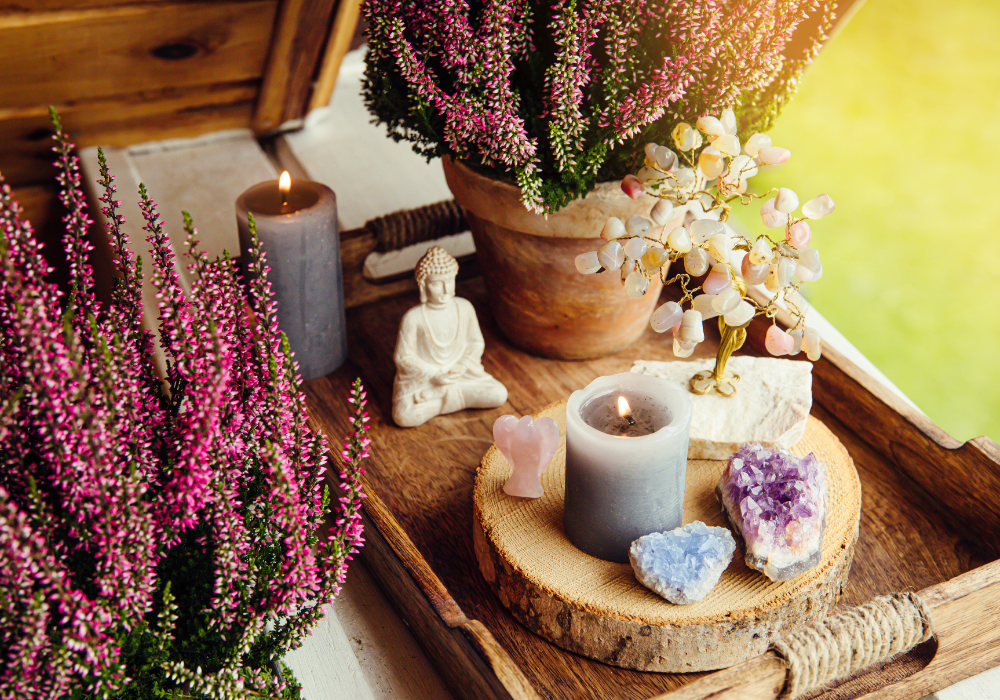No amount of affirmations can cover up these major spiritual pitfalls.

Spirituality should feel like a supportive hug for your soul—but sometimes, it quietly turns into another cage. The modern wellness world is full of “good vibes only” slogans, glittery crystals, and endless affirmations that promise instant transformation. But beneath the pretty surface, there are sneaky red flags that can derail your growth, drain your energy, and leave you feeling more lost than enlightened.
It’s easy to get swept up in love-and-light messaging and miss the subtle warning signs that your practice is sliding into bypassing or self-sabotage. You don’t need to toss your sage or stop journaling forever—just learn to spot the traps before they hijack your healing journey. These red flags aren’t here to shame you; they’re invitations to ground deeper and get real. Once you see them clearly, you’ll start to rebuild a practice that actually supports you from the inside out.
1. Believing you’re always “high vibe” is a fast track to emotional burnout.

We all love the idea of floating through life on a constant cloud of good energy. But pushing yourself to stay “high vibe” all the time is a recipe for suppression, not enlightenment. When you ignore anger, sadness, or fear, those feelings don’t vanish—they fester under the surface and leak out in unexpected ways. According to Betina Yanez for the Journal of Personality and Social Psychology, habitually suppressing emotions can blunt positive feelings while leaving negative emotions unchanged—suggesting that suppression actually intensifies emotional imbalance rather than resolving it.
Being human means feeling the full spectrum, not just the Instagram-worthy highlights. True spiritual growth invites you to sit with discomfort and integrate it, not sweep it under a cosmic rug. Embracing your low days doesn’t make you less spiritual; it makes you more honest. Once you stop forcing yourself into a permanent state of bliss, you’ll find real peace feels grounded and genuine, not forced or fragile. It’s okay to be messy—it’s part of the magic.
2. Using “everything happens for a reason” to avoid accountability is spiritual bypassing.

It’s comforting to believe that every setback is divinely orchestrated, but constantly leaning on “everything happens for a reason” can keep you from owning your choices and learning real lessons. While it’s true that challenges can carry growth opportunities, slapping a cosmic sticker on every bad decision stops you from facing patterns that need to change. As highlighted by Steven Petrow for The Washington Post, relying on clichés like “everything happens for a reason” falls under toxic positivity—an emotional suppression tactic that can increase stress, reduce resilience, and interfere with genuine healing by invalidating real experiences.
Accountability doesn’t cancel out faith—it strengthens it. When you admit where you messed up, you reclaim your power to shift course instead of surrendering it to the universe. This mindset shift doesn’t make life feel heavier; it actually frees you from the endless loop of blame and victimhood disguised as “spiritual flow.” Growth requires messy honesty, not just pretty mantras. Once you start balancing trust with personal responsibility, your spiritual journey gets way more authentic—and way more powerful.
3. Shaming others for “low vibes” is a sign your practice has turned toxic.

It’s one thing to protect your energy; it’s another to weaponize “vibes” to judge or exclude people. When you start shaming friends or strangers for being “negative” or “unhealed,” you’re no longer creating healthy boundaries—you’re building walls based on ego.
Spiritual superiority is just another mask for insecurity, and it cuts off real connection. Per Ariane Resnick for Verywell Mind, spiritual narcissism—where people use their spiritual beliefs to feel superior—is linked to emotional invalidation and toxic positivity, leading to relationship breakdowns and emotional harm.
True spiritual growth is compassionate, messy, and inclusive. It allows space for grief, anger, and mistakes, both in yourself and in others. If your first instinct is to ghost someone who’s struggling rather than offer empathy, it might be time to look at what you’re actually protecting. Often, it’s your own discomfort with the parts of yourself you haven’t accepted yet. Dropping this behavior helps you build genuine relationships and a practice rooted in love instead of judgment.
4. Chasing constant “downloads” and signs can keep you stuck in indecision.

There’s nothing wrong with loving synchronicities or looking for guidance from the universe. But when you rely on constant “downloads,” angel numbers, or endless signs to make every move, you lose touch with your own inner authority. Instead of empowering you, it can turn into spiritual procrastination dressed up as devotion.
Over time, waiting for the “perfect” sign can become a crutch that prevents you from taking aligned action. You end up outsourcing your power to external confirmations instead of cultivating trust in your own intuition and decision-making skills. Signs can guide, but they shouldn’t dictate your every step. Real growth often happens when you move forward even without absolute clarity. The universe loves action—it can’t co-create with you if you’re stuck waiting for a neon blinking “yes” forever.
5. Treating spiritual tools like magic fixes keeps you from real integration.

Crystals, tarot cards, and moon rituals can be beautiful supports—but they’re not cure-alls. When you rely on tools as quick fixes rather than aids for deeper self-awareness, your practice can become more about collection than transformation. You can’t just wave a crystal over your heart chakra and expect decades of trauma to vanish overnight.
Spiritual tools are meant to enhance your connection to self and source, not replace the inner work. The hard truth? You can’t journal your way out of accountability or smudge your way out of repeating toxic patterns. Integration requires honest reflection, uncomfortable conversations, and real-world choices. Once you start using tools as mirrors rather than crutches, you unlock their true power—and your own. Spiritual growth becomes less about performing rituals and more about embodying their lessons every single day.
6. Obsessing over “manifesting perfectly” traps you in endless self-blame cycles.

Manifestation can be a powerful tool—until it becomes a rigid rulebook that blames you for every hardship. Believing that every setback means you “weren’t aligned enough” or “thought the wrong thing” turns life’s normal ups and downs into personal failures. Instead of empowering you, this mindset traps you in guilt and self-punishment.
Life is unpredictable, no matter how many vision boards you make. Growth often comes through challenges, not just perfectly manifested wins. Releasing the obsession with “perfect energy” frees you to co-create with the universe rather than fear it.
When you accept that you can’t control every outcome, you make space for grace, resilience, and surprise blessings. Real empowerment is about flexibility and self-compassion, not rigid spiritual scorecards that leave you stuck in shame every time life gets messy.
7. Relying only on “love and light” language denies real shadow work.

“Love and light” sounds beautiful, but when it’s used to gloss over pain or avoid conflict, it becomes spiritual cotton candy—sweet but empty. True healing involves shadow work: facing fears, unpacking trauma, and exploring uncomfortable truths within yourself. Constantly bypassing hard feelings with positivity slogans keeps you spiritually stagnant and disconnected from your real depth.
Shadow work isn’t about dwelling in darkness forever; it’s about integrating every part of you so that your light shines authentically. Once you start acknowledging what’s hiding beneath the “high vibes,” you build true resilience instead of a fragile spiritual persona. Next time you find yourself reaching for an easy affirmation, ask if you’re using it to heal or to hide. The real “light” work is messy, raw, and incredibly liberating once you stop sugarcoating your entire emotional landscape.
8. Expecting spiritual leaders to have all the answers weakens your own intuition.

It’s tempting to put teachers, gurus, or influencers on pedestals and trust them to guide every decision. But when you believe someone else holds all the spiritual keys, you lose connection to your inner voice. No mentor, no matter how wise, can fully understand your unique path or embody your personal truth.
Healthy guidance should empower you to trust yourself, not create dependency. A good teacher helps you peel back your layers, not replace your compass. If you find yourself doubting your gut because it conflicts with what an “expert” said, pause and reflect. Reclaiming your intuition is the ultimate act of spiritual sovereignty. Once you start prioritizing your own inner guidance, you’ll discover a deeper, more unshakeable connection to your path—and to your true self.
9. Seeking constant “good vibes” friendships can limit genuine connection.

It’s easy to want only “high vibe” friends who match your spiritual ideals, but this can turn into a filtered bubble where real connection goes to die. True friendship includes holding space for messy breakdowns, tough conversations, and vulnerable growth—not just moon circles and crystal swaps.
Filtering out anyone who doesn’t match your frequency can actually stunt your emotional growth and keep you from learning essential compassion and patience. Real relationships challenge you to grow beyond comfort, to see others (and yourself) with nuance.
When you stop gatekeeping connection based on “vibes,” you open yourself up to authentic relationships that stretch and strengthen you. In the end, your spiritual path gets richer—and way more human—when you allow it to include all flavors of connection, not just the easy, glittery ones.
10. Using spiritual identity as a personality mask hides your authentic self.

It feels safe to wrap yourself in the identity of “the spiritual one”—the healer, the empath, the forever positive friend. But clinging too tightly to these labels can limit your growth and keep you from evolving beyond your comfort zone. Over time, you might start acting out of expectation rather than genuine feeling, performing “spirituality” instead of truly living it.
Your authentic self is multifaceted and always changing. When you let your spiritual identity define you completely, you risk losing touch with other vital parts of your humanity—like anger, playfulness, or even silliness. Dropping the mask doesn’t mean abandoning your spiritual values; it means allowing them to support your full, complex self rather than replace it. Once you embrace all sides of who you are, your practice deepens and becomes something you embody rather than just display.
11. Avoiding professional help and calling it “trusting the universe” can harm you.

Spirituality can be deeply healing, but it shouldn’t replace therapy, medical care, or professional support when needed. Using “trusting the universe” as an excuse to avoid hard conversations with doctors or mental health professionals can delay real healing and put you at risk.
True spiritual growth includes knowing when to lean on earthly resources and community support. You’re not failing spiritually by seeking help—you’re honoring the human experience you chose to live. Combining spiritual practices with grounded, practical care makes you stronger and more whole. Next time you feel tempted to skip that therapy appointment because you want to “just let it flow,” remember: it’s not a betrayal of the universe to take concrete steps for your well-being. In fact, it might be exactly the sign you’ve been asking for.
